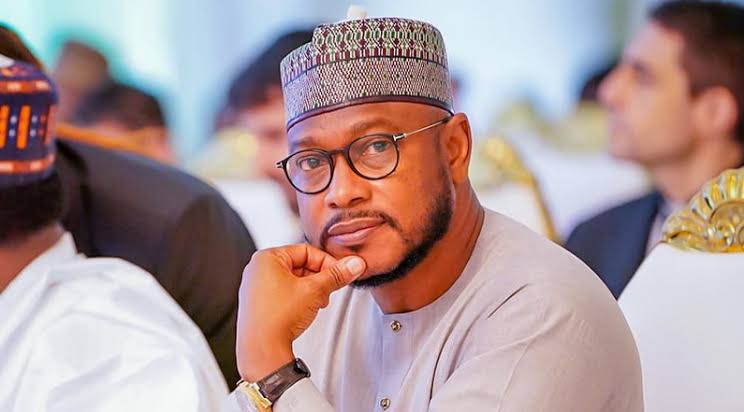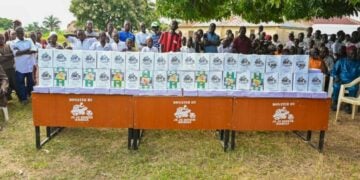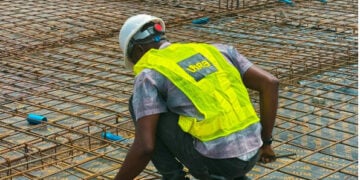Part One: The Builder
The political terrain of Zamfara can be compared to an ancient battlefield, scarred by years of rivalries, shifting alliances, and the restless footsteps of gladiators who have wrestled for dominion over its destiny. For long, the political stage was dominated by familiar actors, each planting its roots deep into the soil of loyalty, patronage, and influence. Politics here was never an act of service; it was a labyrinth of intrigues, syphoning of public funds, nepotism, and religious deception.
Into this charged atmosphere stepped Dauda Lawal — not as a figure bred in the inner sanctums of the old guard, but as a new current breaking against the rocks of convention. His arrival was like the sudden burst of rain upon parched earth: unexpected, refreshing, and unsettling to those who had long grown accustomed to the drought of change. He did not simply enter the space; he disrupted it, like a new rhythm introduced into an old song. His background in banking and global networks gave him a language different from the one spoken by the entrenched political titans, yet it resonated with a people tired of recycled promises.
Lawal’s breakthrough was not a gentle knocking at the gates of Zamfara’s political fortress — it was a breach, a bold leap across the moat of scepticism, forcing open doors that had been guarded by patronism and familiarity. His story became the story of a man who carried the hopes of renewal, weaving himself into the conscience of Zamfara’s political destiny not as an inheritor of the old order, but as the architect of a new dawn.
Like the Gusau River carving its patient path through dry valleys, steady and unyielding, cleansing the earth it touches, Dauda Lawal moves across the political landscape of Zamfara with a message never before heard, action before words. His journey is a tale written in the golden dust of Zamfara’s soil, a soil that hides wealth in its belly but has too often fed its children with sorrow.
His rise is the story of a man who began with the quiet hum of ordinary beginnings yet grew to embody the aspirations of a people long in search of peace, dignity, and prosperity. Born amid the savannah’s endless horizon, he grew up where the call of the muezzin braided with the rustle of millet fields and cotton. A place where every child was taught that life is both duty and destiny. His childhood was not gilded, but it was rich in lessons. He learned early that gold may glitter beneath Zamfara’s hills, but true wealth lies in character, discipline, and the will to rise above hardship. This conviction, planted in the fertile soil of his youth, grew like a sturdy baobab that, today, shades thousands.
Education became his first bridge out of the ordinary. Each classroom was a doorway, each book a lamp. He walked dusty paths to school with dreams tucked under his arm like notebooks, his determination as relentless as the northern harmattan wind. The boy who studied under the dim light of kerosene lamps became the man who would later sit in polished boardrooms, yet he never let the gloss of city skylines blind him to the flickering lamps of his homeland. Like Zamfara’s hunters who venture far but always return to the drumbeats of home, Dauda carried his roots with him no matter how far he traveled.
His career in banking was the crucible where his philosophy of order and accountability was hammered into shape. Rising through the ranks to become Executive Director of First Bank of Nigeria, he mastered the craft of numbers, but to him numbers were not lifeless digits—they were the breaths of families, the pulses of communities, the hopes of nations. In the quiet click of calculators and the shuffle of balance sheets, he saw stories of people: the farmer seeking a loan to till more acres, the trader needing credit to expand her stall, the youth saving pennies for a future brighter than his father’s. Banking, for him, was a discipline of trust, a covenant where figures stood as guardians of human dignity. This ethos would later form the scaffolding of his governance: that public resources are a sacred trust, to be managed with prudence, not plundered with greed.
But his banking success did not lull him into complacency, in those years, Dauda learned that corruption is not just theft but betrayal—betrayal of children who sit in crumbling classrooms, of mothers who walk miles for water, of youths denied opportunity. It was in those trenches of reform that he sharpened his conviction that leadership must be antidote to decay, that governance must be both shield and scalpel: shield to protect the weak, scalpel to cut away rot.
When Dauda Lawal returned to Zamfara’s political stage, it was like the prodigal son who came not empty-handed but bearing tools forged in distant forges. He returned to a land both blessed and broken. Zamfara is a paradox: a state sitting atop gold and silver, shimmering like hidden treasure, yet scarred by poverty and violence. Its fields, once alive with harvest songs on the farms of cotton, millet and sorghum, had too often fallen silent under the height of corruption and the gunfire of banditry. Its villages bore wounds carved by raids that left homes in ashes and hearts in mourning. The contrast was cruel: a land where God’s abundance lay beneath the soil, yet His children walked in hunger and fear.
Dauda’s emergence was, in many ways, a response to this paradox. He stepped into politics not as one dazzled by titles but as one compelled by duty. To him, Zamfara was like a wounded lion, majestic yet bleeding, in need of a healer’s hands and a guardian’s courage. His ideology became a blend of technocratic precision and native empathy: to govern with the discipline of a banker but the heart of a local son. He saw governance as stewardship, where every naira in the treasury is a seed belonging to the people, to be planted carefully so that it may yield harvests of schools, hospitals, roads, pipe borne water, electricity, trade, employment, peace and development.
Security, for him, was not a policy paper but a moral mandate. He inherited a state where fear had become a second skin, where families slept with one eye open, where roads that once bustled with trade now lay deserted under the shadow of bandits. Today, Dauda is approaching insecurity like a farmer confronting locusts: not with despair but with strategy, knowing that to save the harvest one must act swiftly and wisely. He is strengthening collaboration with security agencies, investing in community vigilance, and seeking to dry the swamps in which banditry bred—poverty, idleness, neglect. For him, guns may silence bandits for a time, but only jobs, education, and hope can silence them forever.
His economic vision draws from Zamfara’s soil. He often describes gold as both blessing and burden—a resource that could gild the state’s future if harnessed with transparency, but a curse if left to the claws of exploitation and illegal mining. Like a miner digging carefully so as not to shatter a precious stone, Dauda’s governance seeks to refine the state’s resources into engines of shared prosperity. Agriculture remains another pillar: he envisions fields once ravaged by fear now blooming again with millet, sorghum, and maize, feeding families and fueling trade. In his eyes, every farmer is an investor, every harvest a dividend of peace.
Education, too, is central to his ideology. He has often said that Zamfara’s children must not inherit only the resources beneath their feet but the light in their minds. To govern, in his philosophy, is to build classrooms brighter than the flames of violence, to train teachers who will sow knowledge as diligently as farmers sow seeds. For Dauda, education is both shield and sword: shield against ignorance, sword against poverty. Thus, he swang into action of building schools, paying off years of educational debt at the secondary levels, giving scholarships and bursaries to higher students in higher institutions, supporting indigent students, motivating educational innovations and providing a conducive environment for both the learner and the teacher. The 14 local governments of the state rising anew with hope and vision of a bright future through education.
What makes Dauda Lawal’s political ideology compelling is the way it mirrors the identity of Zamfara itself. Zamfara is a land of contrasts—harsh yet beautiful, wounded yet resilient. Its people are like the griots who sing under starlit skies, carrying histories of struggle yet weaving hope into every song. Dauda, in turn, governs with a sense of purpose: he sees his role as conductor of an orchestra where each community, each culture, each tradition is an instrument. His aim is harmony, not uniformity; symphony, not silence. Like the kora player who draws beauty from both tension and release, he seeks to balance modern governance with cultural roots, reform with tradition, ambition with humility.
Critics, of course, remain watchful. They warn that insecurity’s roots are deep, that corruption’s tentacles are long, that Zamfara’s challenges are mountains not easily moved. But Gamjin Gusau, Odogwu 1 of Africa, often speaks of patience. He likens governance to tending an orchard: you plant today, water diligently, protect against pests, and trust that the harvest will come in season. He does not promise instant miracles, for he knows that quick fixes are like fireworks—bright for a moment, then gone. Instead, he promises steady growth, like a tree that takes years to mature but once grown, offers shade for generations.
His personal journey is itself a parable for his ideology. The boy who once walked dusty paths to school now builds roads for others. The banker who safeguarded billions now guards the people’s meager taxes with equal vigilance. The reformer who confronted corruption now confronts poverty and violence with the same stubborn resolve. His life, like Zamfara’s story, is a testament to resilience: to fall and rise again, to struggle yet sing, to suffer yet hope.
Today, as he walks through the towns and villages of Zamfara, he is received not just as a governor but as a son returned to rebuild his father’s house. That house is battered, its walls cracked by years of neglect, its roof leaking from storms of violence, its floors weakened by poverty. Yet Dauda has come with tools in hand—discipline, vision, empathy—and with determination in his heart. He knows the work will be long, the repairs arduous, but he also knows that once restored, this house will shine with the gold of its soil and the resilience of its people. He is the Gamji tree that provides shelter for all.
Gamjin Gusau’s political ideology and governance are, in the end, a reflection of Zamfara itself: a dance between shadow and light, tradition and progress, despair and hope. He governs like the Gusau River—sometimes gentle, sometimes fierce, but always moving, always carving a path toward renewal. He speaks like the griots, weaving memory with promise, grounding his people in their heritage while pointing them to tomorrow. He carries Zamfara’s burdens on his shoulders like a farmer carrying water jars from the well—step after step, steady, unwavering. In his story, Zamfara finds not only a governor but a guardian, not only a politician but a promise. He is at once son and steward, reformer and reconciler, a man who understands that leadership is not a crown but a yoke, not a privilege but a trust. Like the golden veins running beneath Zamfara’s soil, his ideology runs deep, seen and powerful, shaping decisions, guiding policies, inspiring hope. And if his vision holds, then one day Zamfara’s name may no longer be whispered with sorrow but sung with pride, a land where resources is not only in the earth but in the lives of its people.
Yet as he set about repairing this battered house called Zamfara, the courtyard is growing noisy. Gladiators, armed not with hammers to build but with whips to distract, crowded the arena. Local elections, instead of being a sober reaffirmation of grassroots democracy, became the theatre of their obstruction. In Zamfara’s rugged political savannah, where ambition prowls like restless lions, Dauda found himself not only governing but fencing against shadows.
Professor Rasheedah Liman writes from Gusau, Zamfara State.





